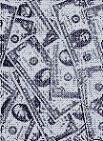Brazil's real extends rally on strong inflows
 Brazil's real extended gains in early trading on Tuesday on strong dollar inflows and the country's improving sovereign bond prices.
Brazil's real extended gains in early trading on Tuesday on strong dollar inflows and the country's improving sovereign bond prices.
The real gained 0.51 percent early to 2.741 per U.S. dollar as it trades at its best level this year and around its strongest point since June 2002.
The Bovespa index of the Sao Paulo Stock Exchange rose 0.5 percent at the open to 24,568 points after closing at its highest level ever on Monday.
Some traders believe the central bank should intervene to buy dollars on the spot market. Dollar purchases would weaken the real to keep exports competitive, impede imports and rebuild scant foreign reserves.
But allowing the real to strengthen further would undercut inflationary pressures the central bank is trying to control. It would also help cut the country's debt-to-gross domestic product ratio by making external debt less expensive to service.
Central Bank President Henrique Meirelles is apparently working to quash expectations of interventions. On Monday, he reiterated at an economics seminar that the monetary authority only targets inflation and does not have a desired value for the real, the Estado de Sao Paulo newspaper reported on Tuesday.
"I think interventions may occur, but not until next year when the central bank knows for sure that it has inflation under control," Hideaki Iha, a currency trader at the Souza Barros brokerage in Sao Paulo, said.
"Until then, there is an unbelievable amount of confidence in the market. People thought it was impossible to sell local currency bonds and yesterday it was done," he added.
The real is gaining a boost from news that Banco Votorantim on Monday issued $75 million in real-denominated global bonds that may soon be repatriated. More companies and even the government are expected to sell the bonds, which eliminate currency risk for issuers and are gaining popularity among buyers.
The real has strengthened to its strongest levels since June 2002, when then-presidential candidate Luiz Inacio Lula da Silva surged in polls, unnerving a market worried about his past pronouncements in favor of a debt moratorium. Lula later promised the market he would stick to a centrist economic model, but the real has yet to fully recover from those election jitters.
In the meantime, its relative weakness has led to record exports and trade surpluses for Brazil and allowed Latin America's largest country to post current account surpluses after years of nagging deficits.
(From Reuters, November 23, 2004)
____________